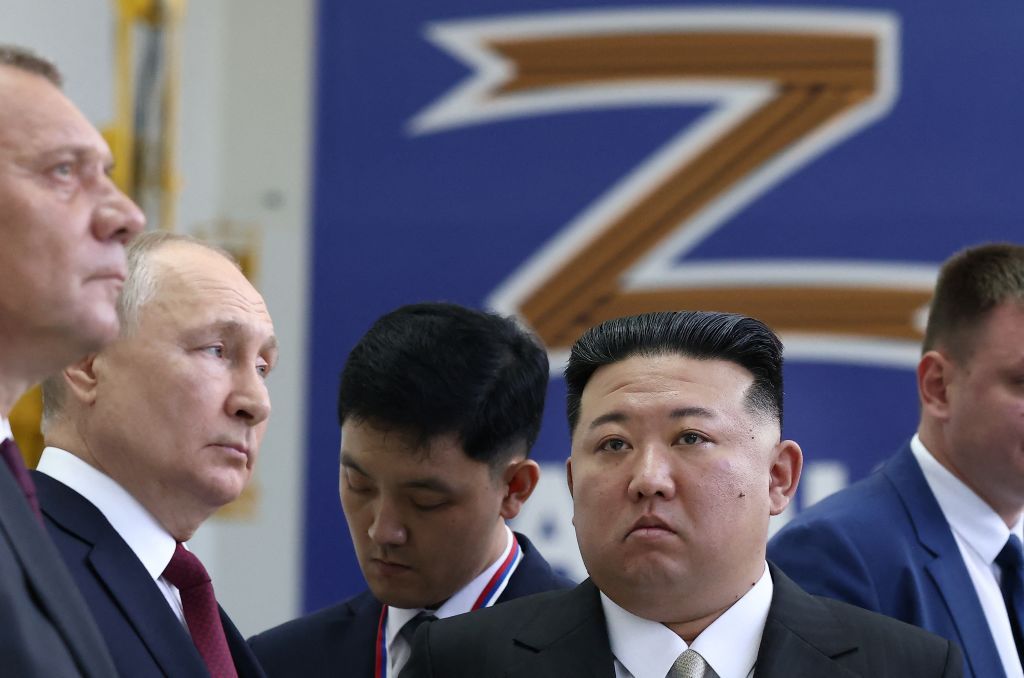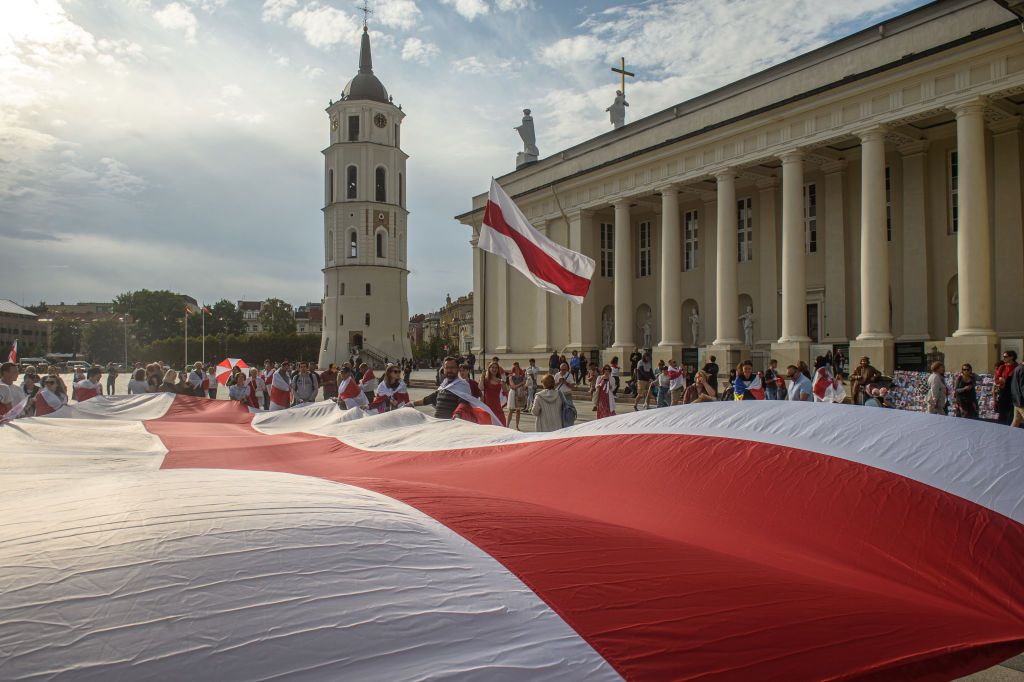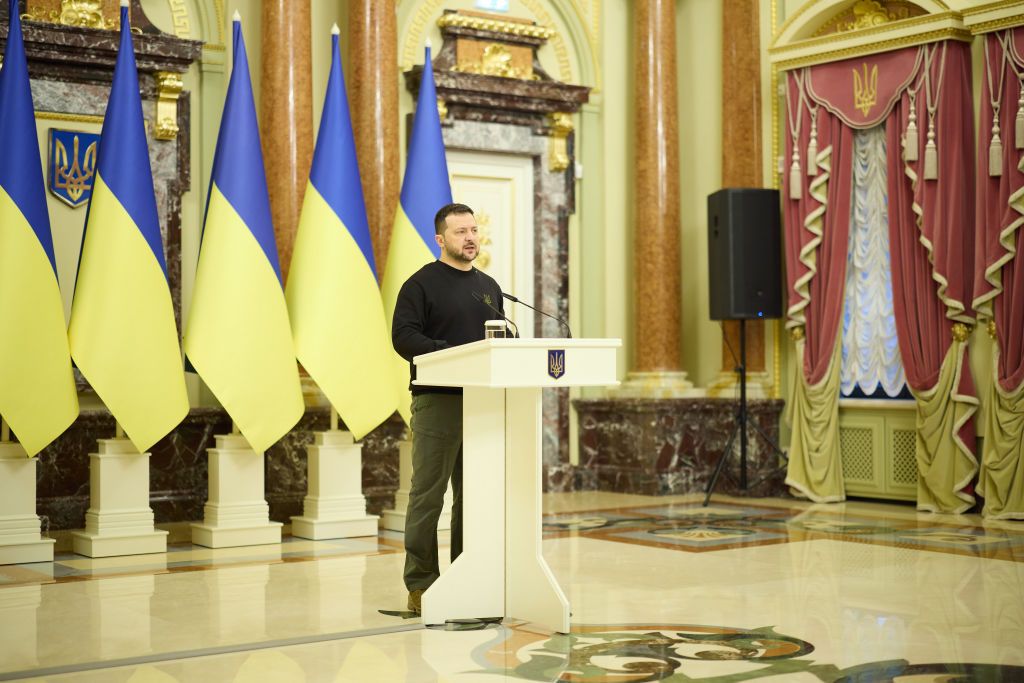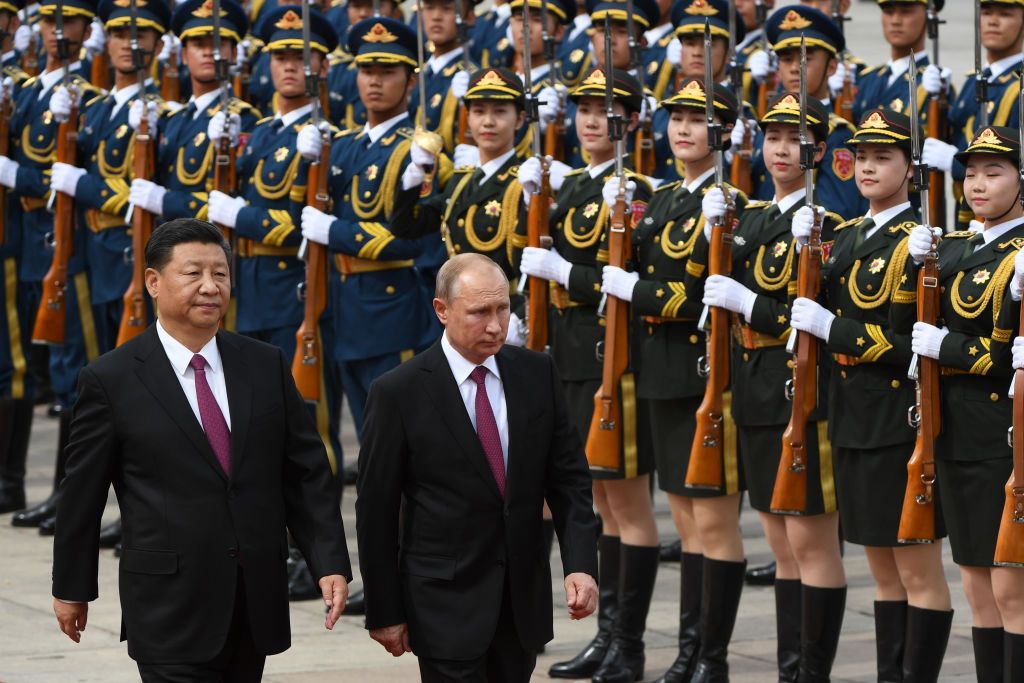Belarus Weekly: Belarus amends military doctrine, permits use of nuclear weapons

Belarus amends its military doctrine, permitting the use of nuclear weapons, while Europe grows increasingly apprehensive over potential for wider war in Europe.
Estonia, Latvia, and Lithuania sign an agreement to establish a Baltic defense zone on their eastern border with Russia and Belarus, reflecting growing security concerns.
Belarusian law enforcers conduct nationwide searches targeting 84 individuals – families of political prisoners and former detainees.
The in absentia trial of six exiled former members of Belarusian law enforcement, who supported the popular uprising against the Lukashenko regime and founded an organization to resist it, has started.
Ukraine’s draft bill on multiple citizenship extends eligibility to people of Ukrainian origin, their global descendants, and foreign volunteer soldiers – including Belarusians serving in the Ukrainian army who are struggling to obtain residence permits in the country.
Belarus amends military doctrine, allowing for use of nuclear weapons
Belarusian Defense Minister Viktar Khrenin has announced that Belarus is to update its military doctrine, allowing it for the first time to provide for the use of nuclear weapons.
Following a meeting of the Belarusian Security Council led by dictator Alexander Lukashenko on Jan. 16, Belarusian Defense Ministry officials disclosed details of the updated military doctrine that deepen the country’s ties to Russia.
“We have clearly defined and conveyed Belarus’ views on the use of tactical nuclear weapons deployed on our territory,” Khrenin told state-owned news agency BelTA.
During a subsequent briefing on Jan. 19, the Defense Minister said that the new doctrine views nuclear weapons as a deterrence against “armed provocations and incidents” along the country’s southern and western borders.
Russia and Belarus signed an agreement on placing Russian non-strategic nuclear weapons on Belarusian territory on May 25, 2023, initially planning to finish the transfer by July 1.
In December 2023, Lukashenko claimed that the Russian nuclear weapons had arrived in Belarus, but no evidence was provided to support the claim.
Lukashenko repeatedly asserted that the Belarusian military would have control of all weapons in the country, whereas Russia has maintained that it remains in control of the nuclear weapons on Belarusian territory, in compliance with the Nuclear Non-Proliferation Treaty.
NATO and the EU condemned the deployment. However, White House press secretary Karine Jean-Pierre said the White House did not see “any reason to adjust our own nuclear posture... nor (see) any indications Russia is preparing to use nuclear weapons for Belarus,” but that the United States would continue to monitor the situation.
While ramping up rhetoric about “hostile neighbors,” Khrenin also claimed that Belarus was ready to “resume a pragmatic dialog” with NATO states, “provided they stop their aggressive rhetoric and actions against us.
The head of the Belarusian Army General Staff Information and Analytical Department, Artsiom Butorin, also stated that the doctrine brings together provisions from international treaties that Belarus has signed. “Belarus will consider an attack on its allies as aggression against itself,” Butorin told a state-owned broadcaster.
The document containing the new doctrine has not been made public. It’s expected to receive approval from the All-Belarusian People’s Assembly, the newly established extra-parliamentary organization that will be formed after the Feb. 25 parliamentary and regional elections in Belarus.
Russia’s staunch ally, Belarus, has served as a launchpad for Russian aggression against Ukraine and as a supplier of the Russian army. While abstaining from sending Belarusian troops to the battlefield, Lukashenko has hosted Russian troops and military bases, as well as Russian Wagner company mercenaries after their short-lived mutiny in June 2023.
Despite the growing militarization of the country and a 53% increase in military spending in 2023, Belarus has dropped four positions in the Global Firepower Military Strength ranking, and is now in 64th position.

Baltic states to establish defense zone along Belarus, Russia borders
Estonia, Latvia, and Lithuania say they plan to build a Baltic defense zone – a chain of linked deterrence fortifications on their borders with Russia and Belarus.
The defense ministers of the three Baltic states signed an agreement on Jan. 19 in Riga, approving the establishment of the defense zone on their eastern borders, as well as signing a memorandum on developing rocket artillery capabilities.
Estonia plans to build 600 bunkers along its border with Russia within the Baltic defense zone by early 2025. The project cost is estimated at 60 million euros, according to Estonian media EER.
“Russia’s war in Ukraine has shown that, in addition to equipment, ammunition and manpower, we also need physical defense facilities on the border to protect Estonia from the first meter,” said Estonian Defense Minister Hanno Pevkur.
Lithuania and Latvia have yet to share their plans for the defense zone.
Lithuania’s Arvydas Anušauskas, Latvia’s Andris Sprūds, and Estonia’s Hanno Pevkur also signed a declaration of intent agreement on the joint deployment of HIMARS multiple rocket launchers in both peacetime and wartime.
The agreement was signed amid growing concerns over Europe’s security. Sweden’s Minister for Civil Defense, Carl-Oskar Bohlin, and armed forces commander Micael Byden urged the nation to prepare mentally for war.
Meanwhile, German Defense Minister Boris Pistorius claimed on Jan. 19 that Russia might attack NATO within five to eight years.
The creation of a Baltic defense zone stems from the 2022 NATO summit agreement that the alliance is to be protected from the first meter of NATO territory.
Belarusian KGB launches mass raids on political prisoners’ families
The Belarusian KGB security service has conducted nationwide raids targeting family members of at least 84 political prisoners, as well as former detainees who chose to stay in Belarus, the Viasna Human Rights Center.
A 76-year-old former political prisoner from Vitsebsk, Barys Khamaida, and Maryna Adamovich, the wife of politician Mikalai Statkevich, sentenced to 14 years in prison, appeared to be among those who were detained. The searches started in the morning of Jan. 23, not all of the raids resulted in a person being detained.
Human rights activists suggest that the charges against the detainees include financing extremist formations and participating in an extremist formation. The regime of Belarusian dictator Alexander Lukashenko routinely brands any opposition organization “extremist.”
The activists link the mass raids to the emergency food assistance project INeedHelpBY, which was supporting those who have lost their income due to political repression in Belarus. The Belarusian KGB earlier designated the project an “extremist formation.”
Lukashenko’s regime currently holds around 1,500 political prisoners, with new detentions occurring daily. The duty of supporting a prisoner, which falls upon the family, is not only emotionally devastating but also financially draining. With the officially reported average salary in Belarus being roughly $582 a month, families say they spend at least $60-100 on a lawyer for each visit, which are numerous, and $158 per package of food and personal belongings for a prisoner in pre-trial detention.
Supporting a convicted prisoner can cost families over $2,000 a year.
In absentia trials of exiled former Belarusian police start in Minsk
The in absentia trials of six former members of Belarusian law enforcement officers who joined in the public protests against contested presidential elections in 2020 started in Minsk on Jan. 22.
All of the defendants – Aliaksandr Azarau, Matsvey Kupreychyk, Ihar Loban, Andrey Astapovich, Uladzimir Zhyhar, and Aleh Talerchyk – now reside abroad. If found guilty, they face being sentenced to dozens of years in prison for inciting social hatred, plotting to forcibly seize power, and creating an extremist group called BYPOL, an organization of former Belarusian law enforcers in exile.
In addition, the leader of BYPOL, Aliaksandr Azarau, was charged with organizing a terrorist attack, which is punishable by the death penalty.
In 2020, the defendants supported the democratic opposition in Belarus and formed BYPOL. With the aim of restoring the rule of law in Belarus, the group has been forming an independent union of law enforcement agencies, drafting law enforcement reforms, and collecting evidence of law enforcers’ crimes against peaceful protesters.
BYPOL also established the Pieramoha plan – a clandestine network of people in Belarus, ready to act on the organization’s command once the opportunity to seize power arises.
Meanwhile, in February 2023, the group took responsibility for a sabotage attack on one of Russia’s A-50 long-range radar aircraft at a military airfield in Belarus.
Following disagreements within the organization, the group split into two formations: BYPOL and BELPOL. Both are engaged in activities to oppose the regime of Belarusian dictator Alexander Lukashenko.
In November 2021, BYPOL was labeled as an “extremist formation.” The Belarusian Supreme Court designated it a “terrorist” organization in August 2022.
The law providing for in absentia trial of Lukashenko’s political opponents came into effect in July 2022. Exiled opposition leader Sviatlana Tsikhanouskaya, was charged with 15 years of imprisonment in absentia along with other opposition members. Stsiapan Putsila and Jan Rudzik, the creators of the NEXTA Telegram channel, which became a mouthpiece of the protests in 2020, were charged with 20 and 19 years of imprisonment, respectively.
Zelensky to submit bill on multiple citizenship to Ukraine’s parliament
Ukrainian President Volodymyr Zelensky has said he plans to submit to Ukraine’s parliament a bill on multiple citizenship that would allow foreign volunteers fighting for Ukraine to apply for a Ukrainian passport.
Zelensky announced the planned extension of citizenship eligibility on Jan. 22 in a video address dedicated to Ukrainian Unity Day.
“All people of Ukrainian origin and their descendants from different countries will be allowed to have our citizenship, (but) of course, (this does not include) citizens of the aggressor state,” Zelensky said.
He added that the bill also concerns foreign fighters who volunteered to defend Ukraine.
Ukrainian Foreign Minister Dmytro Kuleba also said he supported making it legal for Ukrainians to hold multiple citizenships – excluding the citizenships of Russia or other “unfriendly countries.”
The bill’s text is yet to be published. The policy on Belarusian fighters, who are the citizens of a co-aggressor state, remains unknown.
Since the start of the full-scale war, hundreds of Belarusians have joined the Ukrainian army, creating the Kastus Kalinouski Regiment, Terror Battalion, and other smaller formations.
In Belarus, the volunteer fighters risk imprisonment for three to seven years for either participating in the Kalinouski Regiment, which was designated an extremist formation by the regime of Belarusian dictator Alexander Lukashenko, or for being mercenaries. At least 37 Belarusians have been killed in combat.
However, after leaving the Ukrainian army, Belarusian volunteers find themselves in legal limbo: They have experienced legal difficulties in obtaining residence permits in Ukraine.
Neighboring Poland and Lithuania, which have provided refuge for the Belarusian opposition, often consider that former combatants have no proof they were persecuted in Belarus.
A representative of the veteran organization “Association of Belarusian Volunteers,” Andrei Kushnerau, told DW that “the problems faced by Belarusians a year ago remained the same.” He added that some fighters had been banned from entering the country.
While Belarusian volunteers are in a precarious position in Ukraine, the Belarusian regime continues to crack down on any display of support for Ukraine. The Viasna Human Rights Center reports that 1,630 Belarusians were detained for demonstrating an anti-war stance and that at least 25 Belarusians have been convicted for financially supporting the Kalinousky Regiment.
Thirteen other people have been arrested for expressing the intention to join the regiment.

January Uprising. Birth of Belarus' nation
The Spotlight segment provides readers with the historical context of contemporary events in Belarus.
On Jan. 21, Poland’s President Andrzej Duda, Lithuania’s President Gitanas Nauseda, and Sviatlana Tsikhanouskaya, the democratic leader of Belarus, attended a ceremony commemorating the anniversary of the 1863 uprising that historians view as the political birth of the Belarusian nation.
In Poland, the events of 1863-1864 are known as the “January Uprising,” Russians call it the “Polish rebellion,” and in Belarus it was named after its leader, Kastus Kalinouski, an iconic historical figure, and after whom Belarusian fighters in Ukraine have also named their military unit.
The uprising against the Russian Empire, which spread over contemporary Poland, Lithuania, Belarus, and Ukraine, demanded the restoration of the Polish–Lithuanian Commonwealth, which had been torn apart by Austria, Prussia, and Russia.
The uprising was declared by the underground Provisional National Government in Warsaw in a manifesto dated Jan. 22, 1863. The Partisan Committee headed by Kastus Kalinouski in Vilnius announced it was joining the fight against the Russian Empire on Feb. 1.
But while united by the idea of restoring their country, the representatives of the uprising were divided on the issue of involving the peasantry in the revolt. While landowners – representatives of the haute bourgeoisie dominating the uprising in Poland – were hoping to succeed without them through negotiating with the tsarist government and with the help of diplomatic support from the Western powers, Kalinouski believed there was only any prospect of victory if the mass of the peasantry participated in the revolt as well.
After a year of armed clashes, the uprising was suppressed. Kalinouski attempted to organize a new uprising in the spring of 1864, but was betrayed by his supporter Vitold Parfianovich.
The 26-year-old Kalinousky was caught and sentenced to death. On March 10, 1864, he was hanged. Over 12,400 people in Belarus were accused of participating in or sympathizing with the uprising, and were repressed.
The young rebel has become a cornerstone of the “Belarusian idea.” Kalinouski started publishing in the Belarusian language, issuing the illegal newspaper Muzhytskaya Prauda.
Portraying himself as one of the peasants, he wrote about land ownership, protecting Belarusians’ religious rights and language from the tsarist government, and liberating the country from the Russian Empire.
In his famous “Letters from under the gallows,” written before his execution, Kalinouski addressed his people in Belarusian, urging them not to stay behind “if you hear that your brothers from Warsaw are fighting for truth and freedom.”
His devotion to the Belarusian idea is highlighted by the code phrase used under his command. According to the traitor Parfianovich’s testimony, it goes as follows:
- Who do you love?
- Belarus.
- That’s reciprocal.















